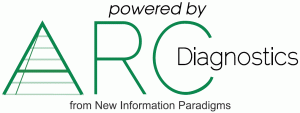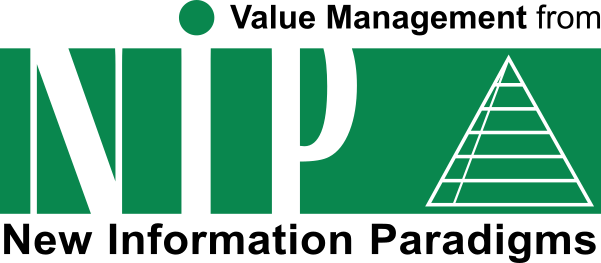About NIP
The Value Management approach from New Information Paradigms (NIP) is the culmination of over 30 years of experience and expertise, and fully embodies NIP’s Authentic Value philosophy and principles.
Everything that NIP does – and has ever done – is about encapsulating and supporting the process of getting to the Things That Matter, such that they can:
- Be expressed and communicated in meaningful ways to relevant stakeholders.
- Be made measurable.
- Used to engage and motivate people.
- Form the basis of relationships and plans.
- Have actions identified and completed to realise the Value that they relate to.
People are then aligned on what matters most, resilient to change as it occurs, and coherent in the things that they do – the ARC of our ARC Diagnostics – and this is what leads to Authentic Value: the overall name we’ve given to what we do.

NIP Has the Track Record
Since NIP’s inception in 1989, this has been the focus of our systems, marked by these major milestones:
- 1990: our first product, the Information Partner, captured, tagged and organised information from predominantly subscription-based information sources to support professional teams in capturing and sharing knowledge. It went on to win a prestigious internal BP innovation award in 1992.
- 1994: our most long-lived solution, MedInfoSys®, was launched to support medical information professionals in developing relationships with, and providing crucial safety and product information to, partners, medical practitioners and customers.
- 1997: automation of the London Stock Exchange’s UK Listings function – a crucial high-level hub for B2B relationships – which later won an Economist publication “Knowledge Capture & Access Award”.
- 2000: development of a suite of solutions for Waitrose to support and manage relationships with key suppliers: a Supply Chain and Responsible Sourcing Management system followed in 2002; a Market Planning and Business Management system in 2003.
- 2005: launch of a Contracts Register solution in the public sector, allowing groups of Public Sector bodies to securely share details of current and proposed contracts.
- 2008: encapsulation and online delivery of BS PAS 11000 support tools (later BS 11000 adnnd eventually ISO 44001), which focused on improving collaborative relationships and outcomes.
- 2013: launch of our diagnostic framework, first used to encapsulate and automate the SC21 Relationship Management Review/Relationship Measurement Matrix processes (RMR/RMM).
- 2018: diagnostic support for the LGA’s National Procurement Strategy (NPS) launched in conjunction with SPS for every English local authority (and some in Wales and Northern Ireland) to self-assess operational status, gain awareness, gauge progress and identify improvement priorities.
- 2019: conclusion of three diagnostic processes with the DIO and Amey that helped them start to turn around their failing £1.2bn outsourcing relationship (case study).
NIP Has the Know-how
Throughout this journey, we have also acquired, synthesised and added to a vast body of knowledge and expertise:

- 1992: Lotus Notes recognised as the leading software of its time for supporting collaboration and relationships, and introduced internally, with NIP becoming a Premium Partner in 1994.
- 1995: recognising how the emerging Internet would dramatically impact the world, we became early developers of web-based solutions and early adopters of Open Source technologies.
- 2002: we launched fully web-based versions of key solutions, including MedInfoSys®, and as early as 2007 were far ahead of the curve by offering them on a SaaS basis.
- 2012: built and contributed to the BS11000.com site (then the home of the collaborative working community), and mapped the ASAP Alliance Life Cycle Framework to BS11000, for inclusion in the 2013 edition of The ASAP Handbook.
- 2016: assembled our first generic Value Code (VCs) libraries to support the encapsulation of the “Things That Matter”..
- 2017: Agile VC engine created for 1. diagnosing the coverage and effectiveness of an existing tool or set of tools for particular applications, and 2. generating diagnostics “on the fly” with embedded cross-referencing and links to any number of the >90 mapped tools.
- 2018: development of expertise on complexity as the explanation and heuristic of today’s global environment – what complexity is, what its challenges are, why existing command-and-control approaches in response are ineffective, and what a complexity-aware approach looks like in contrast.
- 2021: completion of our Value Realisation Framework that organises and describes 45 Value Accelerators (separate and specific activities or processes to fulfil specific Value-related purposes) into 17 Value Paths (distinct “tasks” or stages that deliver a new asset, capability or “skill” in pursuit of Value), all within 9 Value Modes (distinct, but complementary, focuses for Value realisation). This forms the basis of our Value Management approach.
- 2022: development of our Value Schema, a comprehensive mapping of different “levels” of value to each other – individual values, character traits, organisational culture, etc – to describe what value looks like in different contexts and how its expression at one “level” is reflected at others. Synthesising and adding to multiple materials from academia and consultancies, the Value Schema is used in conjunction with the Value Realisation Framework to shape various diagnostics.
No other company has the combination of longevity, vision, business knowhow and technical excellence that NIP has…
…and this is how you can know that – through diagnostic processes that embed all of the above – we know how and why Value Management works.

